US Navy Veteran Held Hostage Sues Iran For $1 Billion Over Torture

An American Navy veteran who was jailed in Iran for nearly two years has sued the Islamic Republic claiming that he was kidnapped, held hostage, and tortured.

An American Navy veteran who was jailed in Iran for nearly two years has sued the Islamic Republic claiming that he was kidnapped, held hostage, and tortured.
In his lawsuit filed in federal court in Washington, DC, Michael White alleged that he suffered “prolonged and continuous” torture in Iran to pressure him to falsely confess that he was a spy for the US government, .
In a 156-page manuscript that he wrote behind bars, he described in detail how he was beaten and punched, whipped on his feet, and deprived of food and drink.
In a 31-page complaint, the lawsuit said he was lured to travel to Iran in the summer of 2018 by a woman he considered his girlfriend, then he was kidnapped by Iranian agents and put in prison.
He was charged with insulting the Supreme Leader Ali Khamenei and cooperating with the US government against Iran and sentenced to 10 years in prison without a trial. The lawsuit says the charges were fabricated.
If Iran does not respond to the allegations, a judge could enter a default judgment on White’s behalf, enabling him to collect damages from a fund set up for victims of acts of state-sponsored terrorism.
He was released in June 2020 after 683 days of incarceration.
Although US and Iranian officials repeatedly denied claims about a prisoner exchange, just a day before White’s release, an Iranian professor who was arrested in the US for violating sanctions on Iran was acquitted and returned to Iran.
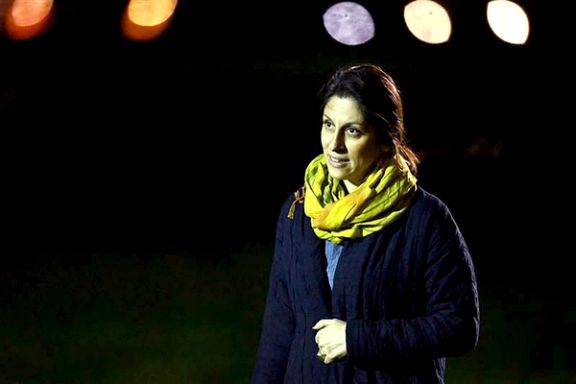
While London paid Tehran $530 million to free two British dual nationals, it is not clear if the cash is at Iran’s disposal, or has strings attached to it.
The Iranian Foreign Ministry Spokesman Saeed Khatibzadeh insisted that the funds have been put at the disposal of Iran and Tehran has full control of it. "It is only Iran and not any other party including the UK that can determine how the money is going to be spent."
The British side has offered a different account about the payment. According to a statement by the British Foreign Secretary Liz Truss, "The IMS debt has been settled in full compliance with UK and international sanctions and all legal obligations. These funds will be ring-fenced solely for the purchase of humanitarian goods."
The Guardian had earlier reported that that the sum will be spent under the supervision of Switzerland.
But Russ also said: "Last December I met Omani Foreign Minister Badr to secure Oman’s diplomatic assistance. We are grateful to our friends in Oman for their support in securing the return of our nationals."
Meanwhile, other sources in London told Iran International TV that the sum is at the disposal of the Central Bank of Oman as a credit line and will be paid for purchases made by Iran and verified as being spent for humanitarian needs.
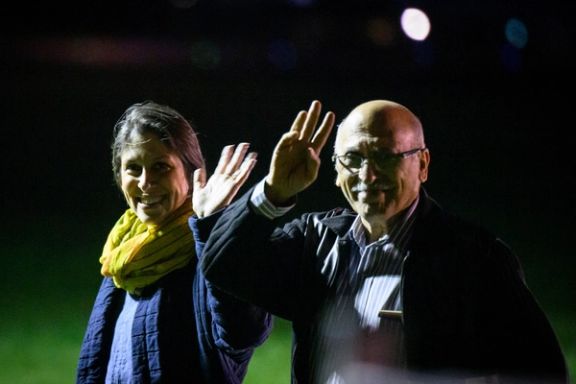
Yet another source told the IITV, that the US National Security Adviser Jake Sullivan has played a constructive role in facilitating the payment for humanitarian reasons while Iran is being sanctioned by the United States.
The release of dual nationals Nazanin Zaghari-Ratcliffe and Anoosheh Ashoori has been hotly debated in Iran, with hardliner media claiming victory for forcing the UK to pay and their opponents questioning the detention of the dual nationals.
IRGC-linked Fars and Tasnim news agencies as well as other conservative media outlets including Mehr news agency reported on Wednesday that the prisoners were released only after the United Kingdom made the payment to Iran. But Foreign Minister Hossein Amir-Abdolahian has said that that there was no link between the release of the detainees and the money paid.
Amir-Abdollahian also reiterated in an interview with IRNA that money changed hands between the UK and Iran a few days prior to the prisoners' release and although the payment and the release of prisoners took place within a short period, the two events were not connected.
On Thursday, hardline daily Kayhan ruled out the Iranian Foreign Minister's statement and wrote that the UK was "forced" to pay back its $530 million debt.
The official news agency IRNA insisted that the release of the two prisoners was based on humanitarian reasons and a decision made just before the Iranian New Year (Nowruz) and the birthday of the 12th Shiite Imam.
However, former lawmaker Ali Motahari wrote in a tweet that "If Iranian officials are telling the truth about releasing Zaghari-Ratcliffe for humanitarian reasons, and her imprisonment and release had nothing to do with the UK's debt to Iran, they should explain what she had done to deserve spending 6 years in jail in Tehran."
Some Iranian news outlets including Etemad Online reported that a third British Iranian prisoner Morad Tahbaz was also granted furlough and that he is out of jail and with his family in Tehran. The furlough was reportedly part of the deal that led to the release of the other two prisoners. Why the UK did not demand full freedom for all detainees, having paid hundreds of million of dollars, is not clear.
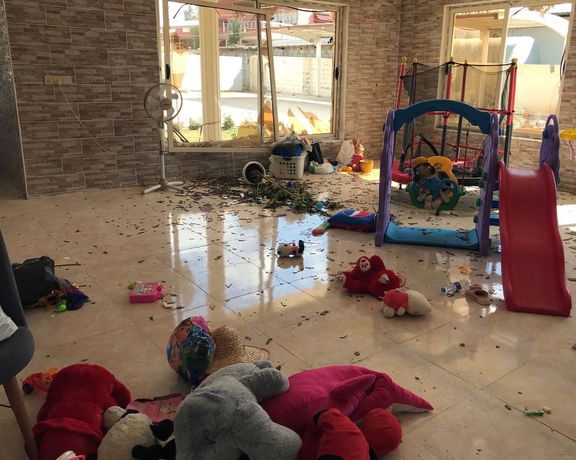
The Revolutionary Guard threatened more strikes on targets in Iraq if Baghdad “continues to allow Israel to use its territory” to launch attacks against Iran.
In an interview with Yemeni TV channel Al Masirah on Thursday, IRGC spokesman Ramezan Sharif claimed that Israel used one of its bases in the Kurdistan Region of Iraq for the mid-February attack that reportedly destroyed hundreds of drones at a base in the Iranian province of Kermanshah.
Iran launched ballistic missiles on Sunday at Erbil claiming there was an Israeli base in the the northern Iraq Kurdish region.
He cited the Iranian ambassador in Iraq as saying that the Iraqi Kurds have been repeatedly warned about the base that was targeted this week, as well as two other bases.
He warned of more attacks if Iraq does not get rid of the other Israeli bases, saying that it is a "natural right" to destroy any base from which Iran’s security is threatened.
Iran's foreign ministry warned Iraqi authorities on Monday that Tehran would not tolerate the use of Iraqi soil by third parties for attacks against Iran, noting that “Iraqi territory was used several times in the past against Iran by third parties including terrorist groups such as Kurdish militants, the United States and the Zionist entity”.
The US mission to the United Nations this week called for a UN Security Council discussion “to condemn Iran’s missile attack”, saying the “the attack struck a civilian residence in Erbil and was an outrageous violation of Iraq’s sovereignty and territorial integrity”.
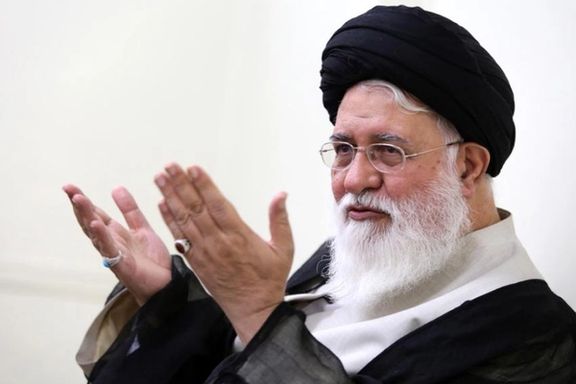
Ayatollah Ahmad Alamolhoda, a senior firebrand cleric in Iran who is President Ebrahim Raisi’s father-in-law, says Saudi Arabia is committing “genocide” against Shiites.
The hardliner said on Wednesday that the Saudi ruling family wants to exterminate Shiites out of the ‘land of revelation’, referring to Saudi Arabia where according to Islamic belief God's word was delivered to Prophet Muhammad, Hawzah News reported.
“Al Saud has been cooperating with the enemy in carrying out this sinister plan since the domination of Britain and the US, and has committed genocide against the Shiites”, he said
Alamolhoda maintained that beheading a 17-year-old teenager is not acceptable by any logic in the world.
Islamic republic also practices the death penalty for minors and says it is neither illegal nor against any of Iran’s international commitments.
Alamolhoda, who is Supreme Leader Ali Khamenei’s representative in Mashhad, added that Riyadh cannot be treated as a "neighbor", in a "peaceful" way.
On Sunday, Iran condemned Saudi Arabia's execution of 81 men – including 41 Shiites -- the previous day, saying, “This inhumane act was in violation of basic principles of human rights and international law, and contrary to human principles and accepted legal procedures".
Tehran also unilaterally suspended the fifth round of talks with Riyadh to mend ties that were cut in 2016 when mobs attacked its embassy in Tehran after Riyadh executed 47 dissidents including the leading Shi'ite cleric Sheikh Nimr al-Nimr.
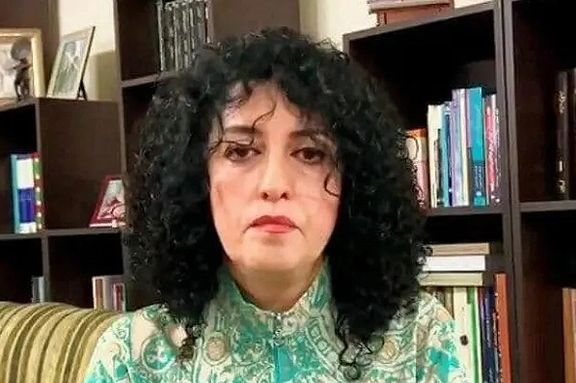
Iran's intelligence agencies prefer dissidents to leave the country when their presence is see as more detrimental than their exile, hacktivists have revealed.
A "highly confidential" letter provided to the BBC's Persian service concerning human rights defender Narges Mohammadi by the hactivist group Edalat-e Ali (Ali's Justice), if authentic, could be proof of such a policy.
In the letter which is attributed to the judicial director general of the intelligence ministry whose name has not been mentioned in the BBC report, the intelligence official suggests that Mohammadi should be allowed to leave the country as keeping her in Iran is more harmful than letting her reside abroad.
In the letter dated November 6 and addressed to Deputy Prosecutor of the Revolutionary Court of Tehran, the intelligence ministry official argues that thanks to the internet Mohammadi can have online meetings with "foreign individuals and embassies" or give interviews to Europe-based television channels. "A ban on leaving the country does not prevent her from her criminal activities."
The letter pointed out that in Iran she could anyway meet online with "foreign individuals and embassies" or give interviews to foreign television channels. The intelligence official suggested that allowing Mohammadi to leave could help highlight differences between her and other dissidents, including US-based Masih Alinejad.
Mohammadi's husband Taghi Rahmani, a pro-reform journalist, left the country for France with the couple's twin children in 2012 after serving a total of 14 years in prison himself but Mohammadi chose to stay in Iran to continue her activities as a human rights defender.
Mohammadi who has not seen her children for ten years says she would visit her husband and children in Paris if she was given a passport and permission to leave but wanted to be able to return to Iran.
Since appearing in August 2021, hackers Edalat-e Ali (Ali's Justice) have released footage from security cameras of Tehran's Evin prison and several confidential documents. Earlier this week the group provided Iran International TVwith a document showing Revolutionary Guards (IRGC) Intelligence wanted oil officials in the previous government banned from leaving Iran. The group’s name evokes the first of the twelve Shiite Imams, Ali, but may also be intended as an sarcastic reference to Supreme Leader Ali Khamenei.
Mohammadi, the vice-president of Defenders of Human Rights Center (DHRC) has been in and out of prison several times since 1998. She was released from prison in October 2020 after serving five and half years on trumped up charges.
Since her release from prison, she has been indicted in two new cases, put on trial and sentenced to prison in absentia because she refused to attend the trials – Mohammadi does not recognize the authority of the Iranian judicial system -- as a show of civil disobedience.
In an Instagram post Thursday, Mohammadi said she will not surrender to the summons to go back to prison to serve the sentences passed on her in her latest trials.
"I'm in my sixth day of disobedience toward [the order] to return to prison. Yesterday I received a letter [from judiciary authorities] to inform that the properties of the person who posted bail for me could be confiscated," she said, adding that she will continue her disobedience as long as the bail is not in danger of forfeiture.
Mohammadi won the 2022 award of the World Organisation Against Torture (OMCT) on March 12 for her documentary film White Torture which addresses the psychological damage caused by solitary confinement in a soundless, white room - a common practice in Iranian prisons.
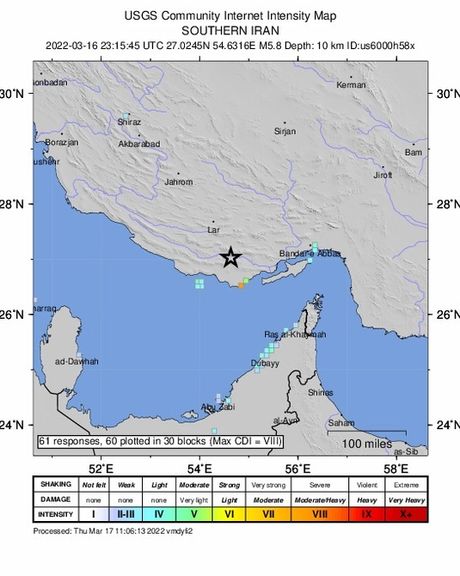
An earthquake measuring 6.0 magnitude has hit the southern Iranian province of Hormozgan and was felt in the United Arab Emirates.
According to the GFZ German Research Center for Geosciences, the quake took place early on Thursday around 2:45 a.m. local time at a depth of 10 kilometers (6.21 miles).
The United States Geological Survey (USGS) said it was a Magnitude 5.8 earthquake and its epicenter was 16 kilometers to Kookherd district and 57 kilometers to Bandar-e Lengeh harbor city.
According to locals, water, electricity and telephone line were out for a few hours in the quake-hit areas.
No casualties or significant damage have been reported so far, but Interior Minister Ahmad Vahidi said that expert teams have been dispatched to the area to assess the damage.
Twitter users in Dubai reported being woken up as their apartment buildings shook from the quake.
Iran is crisscrossed by major geological fault lines and is one of the most earthquake-prone countries in the world because it is located where the Arabian, Indian, and Eurasian tectonic plates meet.
Iran has had a terrible history of massive earthquakes in recent decades, with some killing up to tens of thousands of people and causing billions in damages, such as the magnitude 6.6 quake in Kerman province in 2003 that killed 31,000 people and flattened the ancient city of Bam.